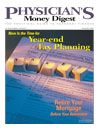Publication
Article
Physician's Money Digest
Launch a Plan to Meet Your Retirement Goals
Author(s):
As you get closer to retirement,you begin to seekhealthy investment returnsbut do not want totake a lot of risk. Yourgoal has become preservation of wealthand you focus on making sure that youcan achieve your retirement objectives.This strategy sounds great, but to meetyour retirement goals you need a reallife strategy. With that in mind, the followingare a few practical ideas on planningfor your retirement.
Start Saving Earlier
The sooner you start, the more timeyou have to build up your retirementfunds. Contributing to a 401(k) will giveyou an immediate tax break and yourprincipal and interest grow tax-deferred.Only withdrawals will be taxed, and bythe time you retire it is very likely thatyou will be in a lower tax bracket.
Make Retirement a Priority
It is not unlikely that your retirementyears will be longer than youractive working years. Life expectancyis based on existing statistics for theaverage population. If you're healthyand take care of yourself, you shouldadd at least 5 years to your life. If yourfamily has a longevity history, addeven more. And don't forget thatadvances in medicine can help toextend life even further in the future.
Monitor Your Expenses
Carefully consider the level of yourexpenses. The rule of thumb says youshould plan for 70% to 80% of currentexpenses in retirement. This ruleassumes that your expenses will godown, but if you plan to travel extensivelyand maintain your currentlifestyle, you may need as much as100%. It is important to sit down andtalk about what you want retirementto look like and then make the projectionsas to how much income you aregoing to need.
Formulate Your Strategy
You must begin early to formulatean investment strategy in line withyour needs and goals and which allowsyou to reach those goals with anacceptable level of risk in your portfolio.Learn about asset allocationand diversification and how thisstrategy can help you reach yourgoals of a secure and comfortableretirement. While in your 20s and30s, most of your portfolio will be ingrowth-oriented investments if youdon't mind the risks, and near retirementyou will tend to hold less riskyinvestments. It is important to takethe steps toward achieving a comfortableretirement as soon as you startworking and to raise your level offinancial knowledge, because investmentdecisions made today will affectthe rest of your life.
William J. Connington III is a wealth advisor
and owner of Connington Wealth Management
Group in Pine Brook, NJ. He
specializes in working with physicians and
health care professionals who are committed
to developing a comprehensive, long-term approach to
improving their quality of life while working toward a more
secure future. To receive a copy of his white paper on
wealth management issues for physicians, or for questions
or comments, call 866-839-0924. For more information,
visit www.conningtonwealth.com.
